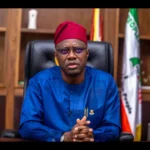The Universal Basic Education Commission (UBEC) has reaffirmed the commitment of President Bola Ahmed Tinubu’s administration to transforming basic education through the comprehensive deployment of technology for teaching and learning in schools across the country.
UBEC’s Executive Secretary, Aisha Garba, made this known on Monday in Abuja during a media briefing ahead of the 2025 International Conference on Smart Education and Digital Literacy (ICSE 2025), jointly organised by the Commission and the Korea International Cooperation Agency (KOICA).
The three-day conference, scheduled to take place from 6–9 May in Abuja, is themed Empowering African Smart Education Through Emerging Technologies.
The conference, which is expected to bring together 144 selected teachers and education professionals from 10 different countries, is designed to enhance digital literacy, integrate cutting-edge technology into classrooms, and foster global best practices in teaching and learning across basic education levels in Nigeria.
Garba disclosed that the Federal Government, through the Commission, has already established over 36 Smart Schools across the country, each equipped with state-of-the-art infrastructure, advanced technology, and content studios staffed by teachers who are skilled in using technology for teaching and learning in the classroom.
According to the Executive Secretary, the event aims to reposition Nigeria’s education system to align with other African nations integrating technology into education.
“For example, Rwanda has been using technology in basic education system for many years. They have reached a level of using AI in their classrooms. For us in Nigeria, we have already started by doing the smart schools, which already many of you are aware of.
“We have about 36 plus one in each of all the states that we have in the country. These smart schools are very high technology advanced with content studio teachers that are already skilled in terms of technology, teaching and learning in classroom,” she said.
Garba emphasised the need to equip basic schools with the infrastructure necessary for a smart education system.
“From the data, it shows that less than 50% of public primary schools in Nigeria have digital technology in their schools.
“So for that, in UBEC, it is very important what we are doing, which is trying to shift from the hardware-invested infrastructure to make our schools in basic education, to make it smart technology-enabled, to deploy technology in providing access to basic education across all parts of Nigeria.
“Whether a child is in the rural area, semi-urban or urban area, there’s a technology appropriate to be applied to that context that will enable the child to read and write. In addition to what the child can get, for us, very key activity is the teacher,” Garba added.
KOICA Country Director, Kim Eunsub, emphasised South Korea’s support for Nigeria’s smart education journey through the KOICA Smart School Initiative in collaboration with UBEC.
He noted that the initiative had already facilitated the construction of state-of-the-art Smart Schools, the training of teachers and administrators, and the sharing of learning resources.
While describing the upcoming conference as a platform to deepen collaboration and build on the progress of the initiative, Kim revealed plans for a second phase of the project to begin in 2026.
Earlier, Deputy Executive Secretary (Technical) of UBEC, Rasaq Akinyemi Olajuwon, explained that the conference seeks to:
-
Expand equitable access to quality basic education through inclusive, technology-driven initiatives.
-
Improve teaching and learning by promoting digital pedagogy.
-
Foster innovative curriculum design and 21st-century skills development, among other goals.
ALSO READ FROM NIGERIAN TRIBUNE
WATCH TOP VIDEOS FROM NIGERIAN TRIBUNE TV
- Let’s Talk About SELF-AWARENESS
- Is Your Confidence Mistaken for Pride? Let’s talk about it
- Is Etiquette About Perfection…Or Just Not Being Rude?
- Top Psychologist Reveal 3 Signs You’re Struggling With Imposter Syndrome
- Do You Pick Up Work-Related Calls at Midnight or Never? Let’s Talk About Boundaries







